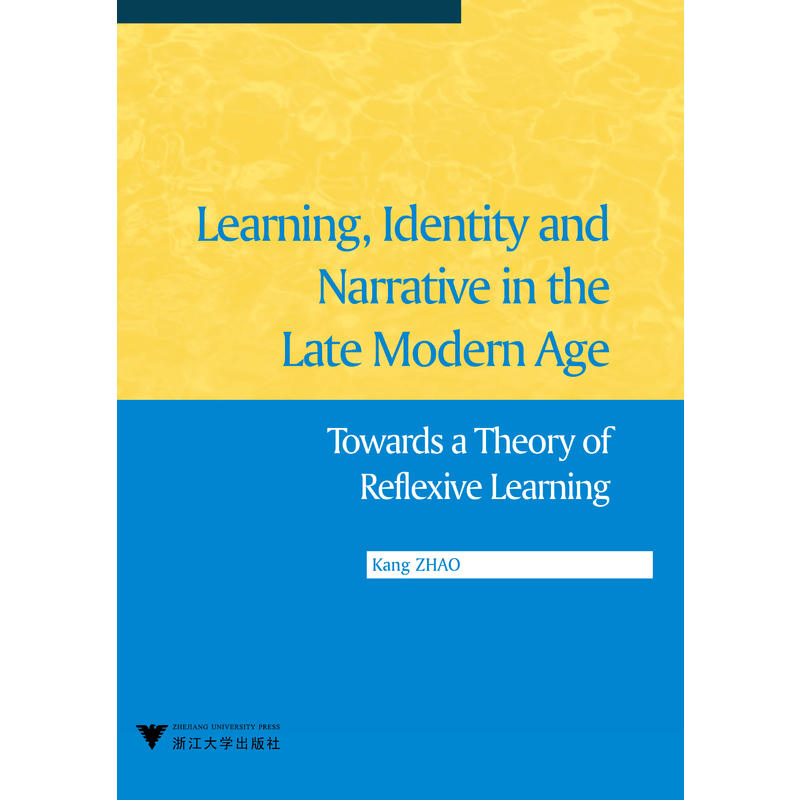- ISBN:9787308135535
- 装帧:一般胶版纸
- 册数:暂无
- 重量:暂无
- 开本:16开
- 页数:189
- 出版时间:2014-09-01
- 条形码:9787308135535 ; 978-7-308-13553-5
本书特色
赵康编著的《晚期现代中的学习身份认同与叙事(走向一个自反性学习理论)(英文版)》是在全球化和欧洲终身学习话语这个大背景下的一个教育理论研究。它探讨了为什么在20世纪后半期西方社会中“人的(自我)认同”成为一个问题,并着重考察了在晚期现代社会中“学习”在人的自我认同形成和转化过程中所具有的角色。作者用哲学的理论视角(主要基于保罗?利科和查尔斯?泰勒的理论)分析了当代社会学中关于现代性与人的认同观点(主要来自安东尼?吉登斯和齐格蒙特?鲍曼的观点)和其对终身学习话语的影响。作者揭示了当代西方终身学习话语中,特别是政策话语中经济话语的主导地位,指出终身学习话语中的道德和价值维度的缺失及其带来的问题。本书*终提出了基于多个对立统一关系的自反性学习(reflexive learning)理论。
内容简介
本书是在优选化和欧洲终身学习话语这个大背景下的一个教育理论研究。它探讨了为什么在20世纪后半期西方社会中“人的(自我)认同”成为一个问题,并着重考察了在晚期现代社会中“学习”在人的自我认同形成和转化过程中所具有的角色。作者用哲学的理论视角(主要基于保罗·利科和查尔斯·泰勒的理论)分析了当代社会学中关于现代性与人的认同观点(主要来自安东尼·吉登斯和齐格蒙特·鲍曼的观点)和其对终身学习话语的影响。作者揭示了当代西方终身学习话语中,特别是政策话语中经济话语的知名品牌地位,指出终身学习话语中的道德和价值维度的缺失及其
目录
Prologue
Chapter 1
The Troubled Concept of Identity
1.1 Introduction
1.2 Identity in the practical worldsociety
1.3 Identity on the theoretical level
1.3.1 Philosophical approaches to identity
1.3.2 Psychological approaches to identity
1.3.3 Sociological approaches to identity
1.4 The need of further exploration
Chapter 2
Why Has Identity Become a Problem in Modern Societies?
2.1 Introduction
2.2 Why identity and modernity?
2.3 What are modernity and modernization?
2.4 Giddens' view: Self-identity with anxieties caused by external
changes
2.4.1 Modernity
2.4.2 What is the latehigh modernity?
2.4.3 Self and self-identity in relation to the late modernity
2.4.4 Lifestyles and self-identity formation
2.5 Bauman's view: Identity as an unfulfilled project due to radical
individualism
2.5.1 What is liquid modernity?
2.5.2 Problem of identity and individual de jure
2.5.3 Citizenship and Individual de facto
2.6 Individualization, modernity and identity
2.7 Other questions related to the problem of identity
2.7.1 Where does the problem of identity exist?
2.7.2 To whom the identity has become a problem?
2.7.3 How does identity become a problem?
2.8 Critical observations
2.8.1 Different "anxieties', different identity problems
2.8.2 Criticisms towards Giddens' analyses: Radical individualism
and hidden power
2.8.3 Criticism towards Bauman
2.9 Implications for lifelong learning and some criticisms
2.10 Reflections on the notion of reflexivity in relation to identity
Chapter 3
Understanding Personal Identity Dialectically: Through the Lens of Paul
Ricoeur
3.1 Introduction: Paradoxes of personal identity
3.2 Ricoeur's view on the self: An ontological view
3.3 Ricoeur's view on personal identity: Is identity a 'thing'?
3.4 Reflexivity and the dialectical understanding of personal
identity
3.5 The role of narrative in understanding identity
Chapter 4
Does Personal Identity Matter? From Charles Taylor's Views
4.1 Introduction: Does personal identity matter?
4.2 Taylor's view on the self
4.2.1 Self in 'moral space'
4.2.2 Self in the web of interlocution
4.2.3 Self is partly constituted by its self-interpretation
4.3 Taylor's definition of identity
4.3.1 Identity as moral being
4.3.2 'Others' in moral identity
4.4 The need of narrative in moral identity
4.4.1 Self-interpretation requires language
4.4.2 Narrative is an inescapable temporal structure
4.4.3 Is narrative an inescapable structure?
Chapter 5
Lifelong Learning, Identity and Narrative in Late Modernity
5.1 Introduction
5.2 The emergence of lifelong learning: From education to learning to
lifelong learning
5.2.1 From the discourse of education to the discourse of
learning
5.2.2 Changes and lifelong learning
5.2.3 Flexibility, reflexivity and lifelong learning
5.2.4 A brief critique
5.3 Problems of the 'reflexive project of the self'
5.4 The role of narrative in lifelong learning in relation to Giddens'
analysis of identity
Chapter 6
Towards a Theory of Reflexive Learning
6.1 Introduction
6.2 Personal identity and lifelong learning
6.2.1 Personal identity as a 'thing' and as a 'being'
6.2.2 'Learning' and 'lifelong learning' that is relevant to personal
identity
6.3 A definition of learning
6.4 Views of reflexive learning that are relevant to identity at a conceptual
level
6.4.1 Reflexive learning in the dialectic between sameness and
selfhood
6.4.2 Reflexive learning in the dialectic between selfhood and
otherness
6.4.3 Reflexive learning in the dialectic between sameness and
otherness
6.4.4 Reflexive learning in the dialectic between horizontal thinking
and vertical thinking
6.5 Views of reflexive learning that are relevant to identity at a moral level
6.5.1 The dialogical self in a moral framework and reflexive
learning
6.5.2 Articulation and reflexive learning
6.5.3 Multiple moral frameworks, authenticity and reflexive
learning
6.6 The need of narrative in learning that is relevant to personal
identity
6.6.1 The need of narrative in lifelong learning concerning personal
identity at a conceptual level
6.6.2 The need of narrative in lifelong learning concerning personal
identity on a practical (moral) level
6.6.3 Narrative learning concerning identity: A theory from an
empirical research
6.7 Conclusions
Epilogue
Bibliography
Index
-

蛤蟆先生去看心理医生
¥26.6¥38.0 -

咬文嚼字二百问
¥9.6¥32.0 -

世界尽头的咖啡馆
¥18.0¥45.0 -

字海探源
¥25.0¥78.0 -

从零开始的女性主义
¥30.3¥52.0 -

乡土中国
¥14.6¥26.0 -

与内心的恐惧对话:摆脱来自亲人的负能量
¥34.1¥48.0 -

《标点符号用法》解读
¥6.2¥15.0 -

中国人的精神
¥9.9¥29.0 -

你能写出好故事-写作的诀窍.大脑的奥秘.认知的陷阱
¥9.8¥32.8 -

社会学:原来这么有趣有用
¥9.1¥36.0 -

焦虑心理学:不畏惧、不逃避,和压力做朋友
¥11.4¥38.0 -

理解生命
¥10.5¥32.8 -

乌合之众:大众心理研究
¥12.1¥36.8 -

从白大褂到病号服:探索医疗中的人性落差
¥12.7¥39.8 -

非暴力沟通心理学 : 用非暴力沟通化解冲突
¥9.0¥36.0 -

上大演讲录(1922-1927卷)(九品)
¥14.0¥52.0 -

那时的大学
¥8.4¥28.0 -

始于极限:女性主义往复书简(八品)
¥22.4¥59.0 -

汉字王国
¥11.5¥46.0













